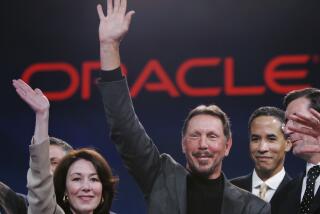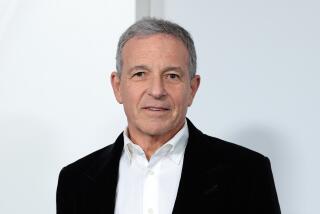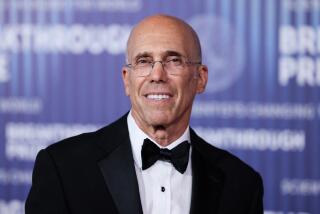Disney Experience Drives Katzenberg
- Share via
When he ran the studio of Walt Disney Co. in the mid-1990s, Jeffrey Katzenberg lobbied tirelessly to become heir apparent to Chief Executive Michael Eisner -- prodding, cajoling and pressuring his boss while toiling to turn out box-office hits that included the animated blockbuster “The Lion King.”
Katzenberg wasn’t rewarded with a promotion. Instead, Eisner unceremoniously fired him in 1994, putting out the word that his underling was an immature character with an oversized ego.
The battle scars from those days may well prove the best insurance policy for investors in the publicly traded entertainment company that Katzenberg is now poised to run as CEO.
“There’s no question Jeffrey’s got the motivation,” said analyst Dennis McAlpine, principle of McAlpine Associates. “He wants to show Eisner what a mistake he made.”
Last week, Katzenberg and his DreamWorks Studios partners disclosed that they were preparing this fall to take public one piece of their enterprise -- the computer-animation factory that is home to the biggest animated U.S. box-office hit of all time: “Shrek 2.”
Yet for all of Katzenberg’s determination, the gambit may well be the diciest of his career.
DreamWorks is angling to become the next Pixar Animation Studios, which enjoys an impressive $3.7-billion value on Wall Street, thanks to its flawless record in theaters. But while Pixar boasts a string of five straight hits -- among them “Toy Story” and “Finding Nemo” -- DreamWorks’ record outside the “Shrek” franchise has been mediocre.
“Jeffrey has very good judgment, he’s a master communicator and relationship builder and is too smart to make rookie mistakes,” said one Wall Street source who knows Katzenberg well. “But a pure-play movie company is a high-risk proposition.”
Certainly, others have found that to be true. Imagine Entertainment went public in 1986, only to be taken private again seven years later by its two principles, producer Brian Grazer and director Ron Howard. They created little value for investors or themselves, and failed in their attempts to expand beyond the volatile movie business.
Even Pixar’s stock has been on a roller coaster ride, in part because of the long fallow periods of more than a year between its movies, when the company must rely on DVD releases and its shallow library for revenue.
DreamWorks cannot comment because of the quiet period required by regulators before a public offering. But analysts say the company is looking to level out the inherent volatility by pumping up the volume, issuing two computer-animated movies a year, even though few rivals have been able to pull off such a feat.
Pixar, the gold standard for the genre, is still striving to raise its output to one movie every year but has struggled because of what it claims is a lack of talent. And with the major studios also looking to compete in computer animation, analysts say it will be hard for DreamWorks to churn out high-quality pictures as swiftly as it wants.
Much of the pressure, meanwhile, will fall squarely on the 53-year-old Katzenberg, the creative force behind DreamWorks’ animated fare.
“Lots of DreamWorks’ success will be tied to Jeffrey,” McAlpine said. “I know he only sleeps two hours a night, but how far can you spread one guy?”
There are bound to be other challenges, too. By issuing its stock to the public after producing the highest-grossing animated movie of all time (“Shrek 2” has taken in $429.5 million to date in the U.S.), DreamWorks’ future films may disappoint investors whose expectations may have been unduly inflated.
Indeed, the stock offering is expected to be held sometime around DreamWorks’ next computer-animated release in October of “Shark Tale.” Though the film is highly anticipated, it has little chance of generating “Shrek”-sized business, industry watchers say.
Katzenberg also will have to figure out how to balance his time between the public company and the privately held parent, which he previously ran and that will distribute the animated movies and continue to produce live-action features. Katzenberg will control the public company along with his partner, David Geffen, while Steven Spielberg, their other partner, remains at the parent.
“There is a built-in conflict and he’ll have to sort it out in a way that is perceived to be fair to shareholders,” the Wall Street source said.
Then there’s the issue of disclosure. Executives who have run private companies -- as Katzenberg has done for the last decade, along with his partners -- can find it jarring to suddenly face the scrutiny of the public market.
In past interviews, Katzenberg has been vague about DreamWorks’ financial strength, declining to disclose specific numbers while simply claiming that its movies have been profitable.
In a filing last week with the Securities and Exchange Commission, DreamWorks revealed that its animation unit lost $189 million in 2003 and has been in the black in only two of the last five years.
“When you’re a public company, you have to live by the quarterly declaration of your actual performance,” noted one veteran Hollywood executive.
In fact, sources say, DreamWorks is largely resorting to a public offering because of the need to pay back one of its main investors, billionaire Microsoft co-founder Paul Allen. Under a 10-year agreement that expires next year, Allen has the right to force DreamWorks to buy out his $660-million stake if he has no other way to cash out.
“This deadline has been looming for two years and has led to merger talks that never went anywhere because DreamWorks priced itself so aggressively,” said one person familiar with the deal. “The IPO is a fail-safe because DreamWorks doesn’t have the money to pay Paul off.”
Katzenberg, of course, has had more than a taste of life at the upper level of a public concern.
As Disney’s studio chief, he resuscitated the company’s animation franchise, overseeing a run of profitable movies including “Beauty and the Beast,” “Aladdin” and “The Lion King.” Katzenberg also had early success in reviving Disney’s live-action business with such films as “Good Morning Vietnam” and “Pretty Woman.”
“I think Jeffrey is one of the best ... executives in the business and has all the skills and abilities to lead any company,” said Dick Cook, who worked for Katzenberg at Disney and is now chairman of Disney Studios.
But Katzenberg’s relationship with Eisner soured when he unsuccessfully pressed for the No. 2 job at Disney after the company’s president, Frank Wells, died in a helicopter crash.
The animosities erupted into one of the biggest legal disputes in Hollywood after Katzenberg sued Disney in 1996, contending that the company breached his employment contract.
During court testimony, Eisner sought to portray Katzenberg as overly demanding and greedy. At the same time, Eisner was confronted with disparaging statements that he had made about Katzenberg, including most infamously, “I hate the little midget.” The case was settled in 1999, with Katzenberg walking away with an undisclosed sum estimated to be at least $250 million.
Eisner painted a particularly unflattering portrait of his one-time protege in his autobiography, “Work in Progress.”
“My deepest concerns about Jeffrey had to do with the way he conducted himself, and the degree to which he focused on his own agenda rather than the company more broadly,” Eisner wrote.
The Disney board shared Eisner’s assessment that Katzenberg was not ready to step into Frank Wells’ shoes, said a source familiar with the directors’ thinking at the time. The board’s view was that, despite his undeniable creative talents, Katzenberg lacked both the experience and the temperament needed to run a multifaceted company such as Disney.
Some who know Katzenberg say that he has softened his abrasive style, at least a little bit, over the last 10 years.
“Since leaving Disney, he’s made a concerted effort to realize he needs to conduct himself in a different way,” said one industry executive. “At least he’s changed the veneer.”
Ultimately, though, it will be Katzenberg’s ability to make money -- not friends -- that determines how he fares as DreamWorks’ CEO.
To that end, he has at least some advantages over Pixar. A big one, industry executives say, is that DreamWorks owns 100% of the movies it makes. By contrast, Pixar’s movies are, at least for now, 50% owned by Disney.
That gives DreamWorks -- and Katzenberg -- a lot of upside potential and, some believe, a real shot at becoming a Wall Street darling.
*
Times staff writers Claudia Eller and Richard Verrier contributed to this report.
More to Read
The biggest entertainment stories
Get our big stories about Hollywood, film, television, music, arts, culture and more right in your inbox as soon as they publish.
You may occasionally receive promotional content from the Los Angeles Times.










